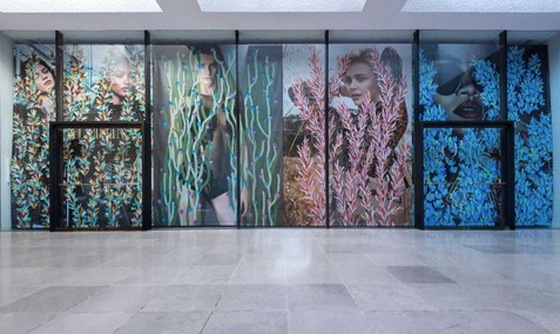|
Reflections on Viewing Michael De Feo's Installation "Crosstown Traffic" at Rice Gallery, Rice University When I first viewed the art installation by Michael de Feo, I liked it. The glass panels, with photographs of larger than life female models advertising luxury goods, partially ornamented and obscured by the artist’s painterly tendrils and flourishes, gave a swirling sense of wild nature and movement, which complemented and contrasted with the chic women, frozen in artificial pose. Then I sat and pondered, and saw beneath their beauty, behind the curling tendrils which hold them prisoner in sylvan grasp, like wild animals ensnared. Underwater weeds seeking to hold them fast, dangerous African landscapes fraught with danger. Or was the installation simply showing us the dangers of the urban jungle? I saw each one of them as Eve, temptress, sowing corrupting seeds of discontent in the marrow of our life, to make us dream of what might be, instilling a longing for what we lack, seductively seducing us away from gratitude for what we have. Are they the tools of advertising moguls on Wall Street, working subliminally on the collective unconscious? Are we the viewers the real prey in their big game? Is this truth or dream? Illusion or reality? Perhaps beauty itself is a myth? Are they but symbols of spurious values which pervade our society today? Are they a symptom of a malaise in our midst which manifests itself as pandemic violence and physical sickness? Cancer of the soul and of the body. There is no separation between body, mind and spirit, so why not? Beautiful or ugly, good or bad, we all end up eventually on the trash heap of history, dust of mortality, which tells no tales, leaves no traces, forgotten like yesterday’s fashion or last night’s dinner. History is fickle and moves only forward, leaving behind the good, the bad and the ugly. It is indiscriminate, for isn’t history constantly being re-created and relativized by the victors? There’s also something almost Victorian about these panels: “Little girls should be seen and not heard,” echo the suffocating voices of my English childhood, as I stare at their silent faces. What would they say if they were allowed a voice? Money buys all sorts of things, from bodies to silence to rulers of nations. Isn’t it time for women to say ‘no’ to objectification? Like poor Ophelia drowned beneath murderous waters they stare at us, the starers, numbed and muted in their beautiful isolation, entombed behind cold unfeeling glass. Do they envy us, I wonder? Want to be free like us, the voyeurs? But the big question is: Are any of us free, or is that an illusion which also reaches out and holds us in its tentacles? Are they after all reflecting back to us our own reflections, trapping us all in lust and envy, trying to warn us of the dangers of false values, of the sad decline of beauty, truth and goodness? Surely such eternal values can never die, though looking through the glass, perhaps we see a void which makes us sad and melancholy, because we are obliged to look into our own aching, endless loneliness. Susan P. Blevins Susan P. Blevins was born in England, lived 26 years in Italy, and has now resided in the USA for the past 24 years, first in Taos, NM, and currently in Houston, TX. While living in Rome she had a weekly column in an international, English-language newspaper, writing about food and restaurant reviews primarily, though not exclusively. Since living in the USA she has written pieces on gardens and gardening for N. American and European publications, and she is now writing stories of her life and travels and gaining traction in various literary publications. She loves reading, writing, cats, classical music, and stimulating conversation.
0 Comments
Your comment will be posted after it is approved.
Leave a Reply. |
The Ekphrastic Review
COOKIES/PRIVACY
This site uses cookies to deliver your best navigation experience this time and next. Continuing here means you consent to cookies. Thank you. Join us on Facebook:
July 2024
|




